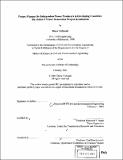Project finance for independent power producers in developing countries : the Paiton I project generation project in Indonesia
Author(s)
Yuliyanti, Diana, 1977-
DownloadFull printable version (22.35Mb)
Other Contributors
Massachusetts Institute of Technology. Dept. of Civil and Environmental Engineering.
Advisor
Massood V. Samii.
Terms of use
Metadata
Show full item recordAbstract
Private investments for independent power producers (IPPs) in developing countries have grown substantially since 1990s as public utilities were unable to keep pace with the countries' electricity demand. The private investors' experiences, however, have not been as smooth as expected with the possibility of deterioration of relationship between the investors and the host governments. The investors' tendency to get high returns to compensate for the risks they perceive as high when investing in developing world sometimes supersedes the main concern of the host government, which is to satisfy the public demands with as low a cost as possible. Some agreements between the investors and the public entity that are crafted to stabilize returns to investors regardless the economic conditions of the host country have been ineffective when the initially anticipated conditions change sharply. The thesis develops a risk-sharing framework between private investors and host governments or public entities to provide mechanisms when the initially anticipated economic condition turns adverse. The framework is developed as a modification of the current model of agreements, with a particular focus being on power purchase agreements (PPAs). The Paiton I project, a coal-fired power generation project in Indonesia, serves as a case study. The Paiton I model PPA have been ineffective in dealing with the inability of the Indonesian public utility to honor the contract when the mid-1997 Asian crisis occurred. Several key lessons arise from the case analyses. The take-or-pay level in the tariff structure is high while the demand projection is over optimistic; the risk arrangement is imbalanced, with the public utility assuming the majority of market risks, currency risks, and force majeure risks; the politically well-connected local participant turned out to be liabilities when government changes; efforts to pursue settlement in the international arbitration resulting in decisions favorable to investors have been difficult to implement in times of crisis. Certain analyses and recommendations covering lessons for better arrangements are outlined. Competition, transparency, and appropriate risks mitigation efforts are the key factors. The thesis closes with a tariff benchmarking analysis to aid the contracted parties in the tariff renegotiation process.
Description
Thesis (S.M.)--Massachusetts Institute of Technology, Dept. of Civil and Environmental Engineering, 2001. Includes bibliographical references (p. 227-232).
Date issued
2001Department
Massachusetts Institute of Technology. Department of Civil and Environmental EngineeringPublisher
Massachusetts Institute of Technology
Keywords
Civil and Environmental Engineering.